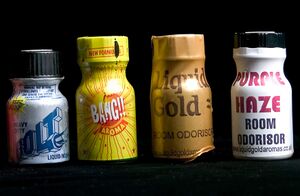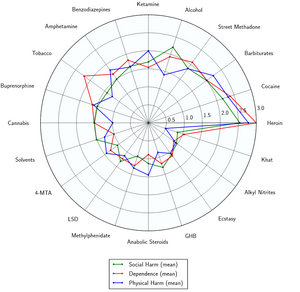Poppers
 |
This article is a stub. As such, it may contain incomplete or wrong information. You can help by expanding it. |

Poppers is a slang term given to the chemical class called alkyl nitrites that are inhaled for recreational purposes, especially in preparation for sex.[1] Today, poppers are mainly sold in cap vials.
Most widely sold concentrated products include the original compound amyl nitrite (isoamyl nitrite, isopentyl nitrite), cyclohexyl nitrite, isobutyl nitrite (2-methylpropyl nitrite), and isopropyl nitrite (2-propyl nitrite). Isopropyl nitrite became popular due to a ban on isobutyl nitrite in the EU in 2007. More rarely sold is the compound butyl nitrite.
They were part of the club culture from the 1970s disco scene to the 1980s, and the 1990s rave scene made their use popular.[2]
History
In 1844, the French chemist Antoine Jérôme Balard synthesized amyl nitrite. Scottish physician Sir Thomas Lauder Brunton (1844–1916) famously pioneered the use of amyl nitrite to treat angina pectoris (now treated with nitroglycerin). He was inspired by earlier work with the same reagent by Arthur Gamgee and Benjamin Ward Richardson. Brunton reasoned that the pain and discomfort of angina could be reduced by administering amyl nitrite to dilate the coronary arteries of patients, thus improving blood flow to the heart muscle.[citation needed]
Time and the Wall Street Journal reported that popper use among homosexual men began as a way to enhance sexual pleasure, but "quickly spread to avant-garde heterosexuals" as a result of aggressive marketing. A series of interviews conducted in the late 1970s revealed a wide spectrum of users.[3]
Chemistry
Poppers are a class of chemicals called alkyl nitrites. These are chemical compounds of structure R–ONO. In more formal terms, they are alkyl esters of nitrous acid.
The first few members of the series are volatile liquids; methyl nitrite and ethyl nitrite are gaseous at room temperature and pressure. Organic nitrites are prepared from alcohols and sodium nitrite in sulfuric acid solution. They decompose slowly on standing, the decomposition products being oxides of nitrogen, water, the alcohol, and polymerization products of the aldehyde.
Pharmacology
Subjective effects
- Vasodilation
- Physical euphoria
- Muscle relaxation
- Time distortion
- Laughter
- Tactile enhancement
- Headaches
Toxicity and Harm Potential

The 2005 Merck Manual of Diagnosis and Therapy reported that there is little evidence of significant hazard associated with inhalation of alkyl nitrites.[1] A study and ranking of drugs for harmfulness devised by British-government advisers and based upon health professionals opinions of harm to both individuals and society placed alkyl nitrites among the less harmful substances when compared to other recreational drugs including alcohol and tobacco.[10] The primary risk of popper usage is a chemical burn if spilled on one's skin.
Poppers are a possible and rare cause of concern of in a small number of cases of maculopathy (eye damage) in recent case reports from UK and France.[20] Some studies have concluded that there may be increased risk for at least temporary retinal damage with habitual popper use in certain users; in a letter to the New England Journal of Medicine, an ophthalmologist described four cases in which recreational users of poppers experienced temporary changes in vision.[21] Another study described foveal (daylight vision) damage in six habitual poppers users.[22] In 2014, optometrists and ophthalmologists reported having noticed an increase in vision loss in chronic poppers users in the UK associated with isopropyl nitrite being substituted for isobutyl nitrite in 2006.[23][24]
Lethal dosage
The only consistently safe route of administration used with poppers is inhalation – oral use of the liquid can prove fatal enough to result in a lethal dosage.[14][15] It is near impossible to overdose through the conventional use of poppers.
An overdose via ingestion (rather than inhalation) may result in cyanosis, unconsciousness, coma, and even death. Methylene blue is a treatment for methemoglobinemia associated with popper use.[5][14][16][17][18] Accidental aspiration of amyl or butyl nitrites may lead to the development of lipoid pneumonia.[15]
Tolerance and addition potential
There is no real tolerance to be gained through 2C-E use. There does not seem to be any addictive potential.
Interactions
Alkyl nitrites are interactive with other vasodilators like sildenafil (Viagra), vardenafil (Levitra), and tadalafil (Cialis), to cause a serious decrease in blood pressure, leading to fainting, stroke, or heart attack.[19]
Legal Issues
Canada
The sale of poppers in any formulation has been banned in Canada. Although not considered a narcotic and not illegal to possess or use, they are considered a drug. Sales that are not authorized can now be punished with fines and prison.[26]
European Union
Since 2007, reformulated poppers containing isopropyl nitrite are sold in Europe; isobutyl nitrite is prohibited,[27] as it is considered carcinogenic.[28]
France
In France, the sale of products containing butyl nitrite, pentyl nitrite, or isomers thereof, has been prohibited since 1990 on grounds of danger to consumers.[29] In 2007, the government extended this prohibition to all alkyl nitrites that were not authorized for sale as drugs.[30]
United Kingdom
In the United Kingdom, poppers are sold in gay clubs/bars, sex shops, drug paraphernalia head shops, over the Internet, and in markets. It is illegal under Medicines Act 1968 to sell them advertised for human consumption, and in order to bypass this, they are usually sold as odorizers.
United States of America
Poppers containing alkyl nitrites other than amyl nitrite are readily available in the United States. Sometimes they are sold as video head cleaners, polish removers, or room odorizers. They have not regained the popularity they had in the 1970s.
See Also
References
- ↑ Development of a rational scale to assess the harm of drugs of potential misuse | http://www.sciencedirect.com/science/article/pii/S0140673607604644